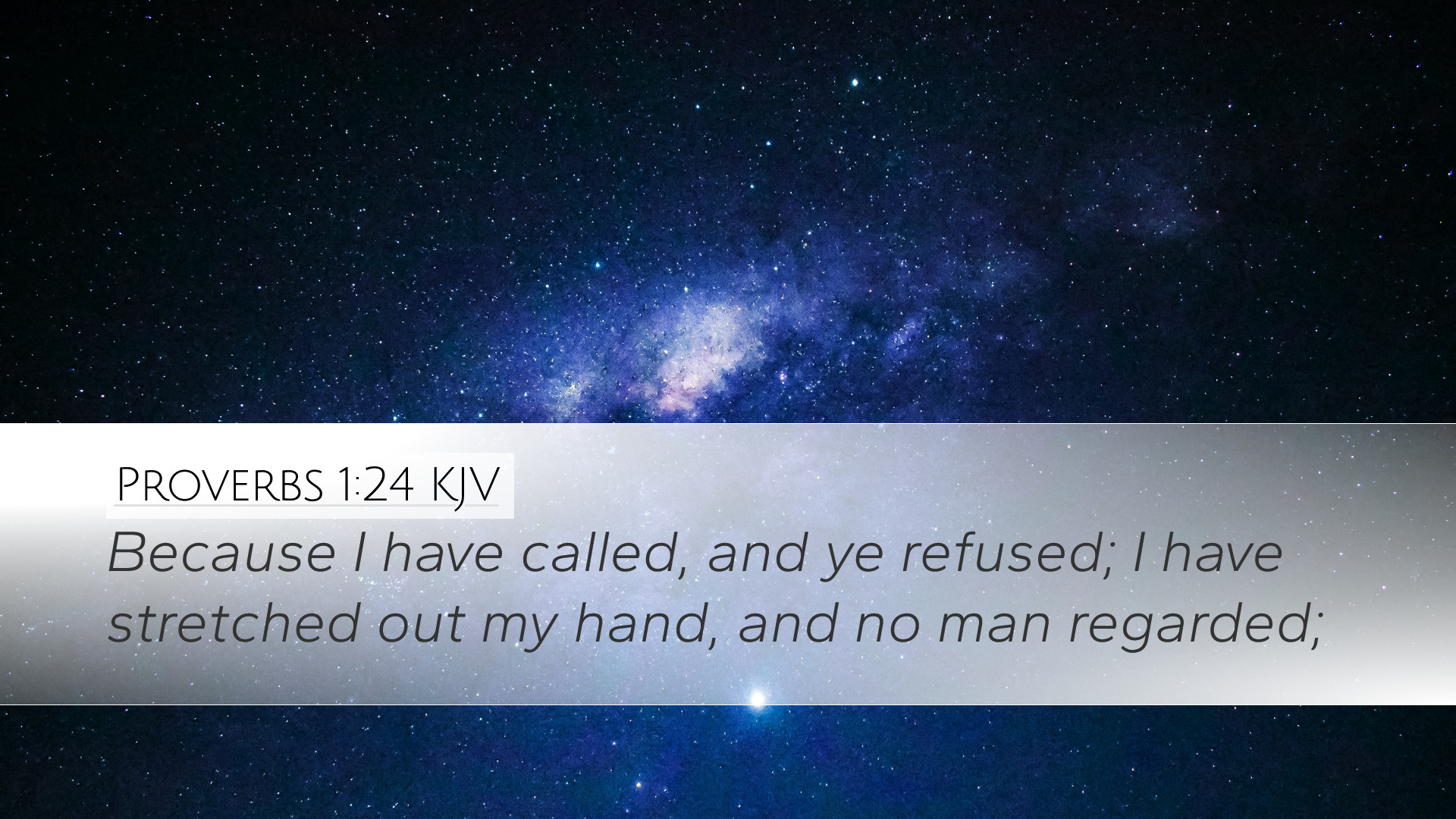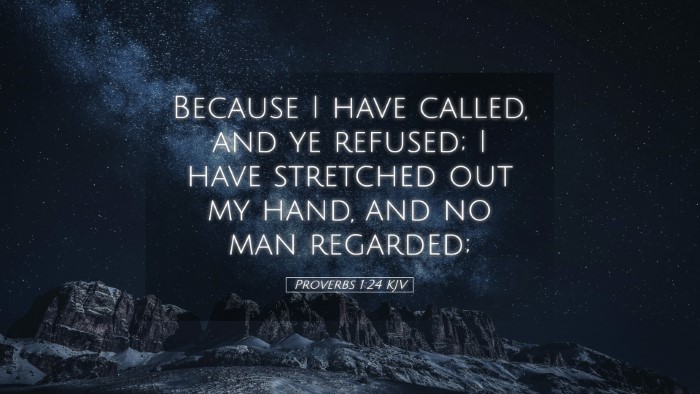Commentary on Proverbs 1:24
Verse: "Because I have called, and ye refused; I have stretched out my hand, and no man regarded."
Introduction
The book of Proverbs is a collection of wise sayings and teachings, aimed at imparting wisdom and understanding. Proverbs 1:24 serves as a sobering reminder of the consequences of rejecting divine wisdom. This verse portrays the Lord’s call to humanity, illustrating both His desire for our attentiveness and the lamentable outcomes of turning a deaf ear to His guidance. In this commentary, we delve into insights from notable public domain commentators, drawing from the works of Matthew Henry, Albert Barnes, and Adam Clarke, to elucidate the verse’s depths and implications.
Contextual Analysis
This verse belongs to an introductory section of Proverbs, where wisdom is personified as calling out in public spaces. The verses leading up to 24 describe the consequences of forsaking wisdom and the fear of the Lord. The call to wisdom is universal, extended to all people, yet it is often met with neglect.
Matthew Henry's Insights
Matthew Henry emphasizes the earnestness of God's call, highlighting that the Lord actively reaches out with both His voice and His hand. The "calling" signifies the divine initiative, while the "stretching out of the hand" symbolizes a willingness to help and guide. This imagery has a powerful emotional resonance, illustrating God's persistent love and the sorrow that comes from human stubbornness.
Henry notes that the refusal of wisdom comes with inherent dangers. He points out that wisdom not only calls but also speaks of the consequences of ignoring that call—disregard and neglect will result in dire consequences, both in this life and the next. He urges the reader to recognize the gravity of rejecting divine guidance and the folly of turning away from wisdom's embrace.
Albert Barnes' Viewpoint
Albert Barnes addresses the implications of refusal regarding the call of wisdom. He suggests that God’s offer of wisdom is gracious and benevolent, yet it is often met with indifference. Barnes poignantly notes that the hand stretched out symbolizes an attempt to pull humanity up from danger and despair. It is an invitation to engage with divine wisdom actively.
Moreover, Barnes highlights the individual responsibility that accompanies such calls. He observes that human refusal can lead to a missed opportunity for growth and understanding. The verse subtly warns that persistent refusal can lead to a hardened heart—a state where wisdom no longer calls nor is heard. This concept of spiritual numbing is profound and calls for self-examination among believers.
Adam Clarke's Interpretation
Adam Clarke provides historical and linguistic context to this verse, underscoring the nature of the call. He describes it as a continual and urgent invitation to partake in a life of wisdom. Clarke points out that the phrase "no man regarded" manifests a universal neglect, not just from an individual but society at large. This reflection stands as a critique of a culture that often overlooks godly wisdom.
Clarke also makes a significant observation regarding the theological implications of God's call. He asserts that while God's grace is offered abundantly, it is not imposed upon anyone. Thus, the refusal to heed His call results in the withdrawal of His presence and guidance—a profound loss. Clarke encourages readers to remain vigilant in response to wisdom’s persistent calls, emphasizing that attentive listening can lead to transformative change.
Theological Themes
In exploring the larger themes of Proverbs 1:24, several theological insights can be delineated:
- Free Will and Accountability: The verse illustrates the dichotomy of divine invitation versus human choice. God's call is clear, yet the refusal indicates a conscious decision against participation in divine wisdom.
- The Nature of Wisdom: Wisdom, as portrayed in Proverbs, is proactive and seeks engagement. This contrasts with a modern view of wisdom as passive contemplation, underscoring that wisdom calls us into action.
- Consequence of Refusal: The verse serves as an early warning about the consequences of ignoring divine counsel, which can lead to a life devoid of purpose and direction. The ramifications of rejecting wisdom extend beyond personal experience to affect community and society.
- God’s Desire to Offer Guidance: The stretching out of God’s hand shows His heart—He desires to guide and sustain His people. The imagery reflects divine patience and longing for relationship, affirming His role as a shepherd.
Application to Life and Ministry
Proverbs 1:24 challenges us to reflect on our own responses to divine wisdom. Within the realms of pastoral ministry, academic study, and personal faith journeys, we must ask ourselves how we are responding to God's ongoing call. Here are several applications for various groups:
- For Pastors: This verse can inspire sermons on the importance of engaging the congregation in wisdom and teaching them to recognize divine calls in their lives.
- For Students: It serves as a reminder to actively seek wisdom and to be open to learning from guidance, emphasizing personal responsibility in spiritual growth.
- For Theologians and Scholars: A deeper exploration of the implications of divine refusal can lead to meaningful discourse on free will and the nature of human response to God’s initiatives.
Conclusion
In summary, Proverbs 1:24 encapsulates a profound truth regarding the call to wisdom and the tragic effects of refusing it. As we heed the reflections of Matthew Henry, Albert Barnes, and Adam Clarke, we glean insight into the heart of God concerning His people—a longing for relationship, guidance, and protection. In our pursuits, whether in ministry, study, or personal spirituality, let us be diligent in heeding the calls of wisdom, lest we find ourselves among those who refuse and disregard the hand that reaches out in love and care.


